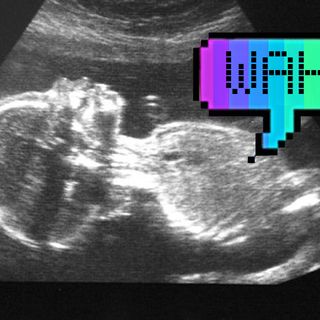
The Overlooked, Little Understood Condition Often Mistaken for PMS
Premenstrual dysphoric disorder is something we should be talking about — and researching.

When Shehla Rashid, a social activist and Jawaharlal Nehru University graduate student, started a Twitter thread about why she was feeling suicidal, it started a conversation not about depression, or stress, but about a condition no one knows much about: premenstrual dysphoric disorder, or PMDD.
In a series of tweets, Rashid said, “A few days ago, I started having strong suicidal thoughts. I had been feeling that way for two weeks. But that night, I actually looked up ways to end my life & enacted many of them in my head. Next day, I got my period. I looked up ‘PMS + suicide’ and found out about PMDD. PMDD is not often acknowledged as an issue, because, well, it concerns women. But if you care about your sister, partner, or friend do raise awareness about PMDD. It’s scary how real it can get. You start picking ways and spots to end your life. You start planning it! In a world where algorithms will help you end your life if you want to end your life, it’s really important to share information about PMDD – premenstrual dysphoric disorder — a severe form of PMS that can even make you suicidal.”
It set off a tidal wave of responses — women either confessing that they were undergoing a similarly devastating experience, or expressing that they had never heard of PMDD at all.
“Didn’t know about this. I think this is what I’ve been struggling with the past few months. Thank you for sharing this”
“I never knew PMDD exists. PMS is itself worse and PMDD, I can’t imagine. Thank you for bringing it to the table.”
“I didn’t seek help until a few years ago, spent the best part of 20yrs losing my mind every month then the cloud lifting as soon as my period started, wouldnt wish it on my worst enemy. I hope you find a fix that works for you.”
The National Center for Biotechnology describes premenstrual dysphoric disorder as a severe form of premenstrual syndrome. Like PMS, PMDD follows a predictable, cyclic pattern. Symptoms begin with ovulation and end shortly after menstruation begins, making it difficult for women to identify where regular PMS ends and the more extreme PMDD begins.
“Researchers do not know the exact cause of PMDD.”
“For years, in the days before each period, I would be very low, and it was so bad I’d struggle to get out of bed,” says Meera Shah, a 34-year-old homemaker in Mumbai. “I would get irritated easily, feel overwhelmed about taking the simplest of decisions and I would keep thinking of ways for self-destruction.”
Since these feelings would come and go with her periods, it took her a long time to realize that it was not just PMS. “When I told my gynecologist about it, she immediately diagnosed it as PMDD,” Shah said.
PMS symptoms typically include tenderness of the breasts, abdominal pain along with headaches, back pain and fatigue. They may also feel generally down or irritable, and have lower self-esteem in the days leading up to their period. Some might also feel like they are losing control over their body and emotions.
In extreme cases, when it is so severe that she complains of depression or anxiety, it can be termed as PMDD. Doctors say for a diagnosis to be made, the symptoms must cause significant distress or impair work or interpersonal relationships, be present across several menstrual cycles, appear in the week before the onset of a menstrual period, and diminish and disappear shortly after the onset of the period.
A 2017 study has revealed that of the 20% of women suffering from PMS in India, 8% show signs of PMDD, indicating that a large chunk of the country’s female population struggles with physical and mental health regularly.
Yet the condition is shrouded in misperceptions that stem from a bigger fact: “Researchers do not know the exact cause of PMDD. Most think it is an abnormal reaction to hormonal changes related to menstruation,” says Dr Sushma Tomar, Obsetrician and Gynecologist at Fortis Hospital.
Traditionally, the medical and scientific communities have viewed menstruation as a monthly aberration from a normal state – therefore, what is normal and what is abnormal during menstruation is difficult to parse; little to no research into PMS, PMDD and the most extreme, menstrual psychosis, has been conducted. While some researchers are starting to explore what menstruation means for women’s bodies and challenging this view, progress is slow, leaving many women bewildered by what happens to them each month.
“I’m sure the medications are doing what they’re supposed to, but when I finally accepted I needed help, it felt like half my job was done.”
“PMS and PMDD can be confusing but observing symptoms over a course of time and talking about it can help gynecologists detect the problem as the first step in getting [women] help,” says Dr Kedar Tilwe, psychiatrist, sexologist and geriatric psychiatrist at Hiranandani Hospital.
Dr Rajeshwari Pawar, obstetrician and gynecologist at Pune’s Motherhood Hospital, says that one of the most common ways to treat PMDD is via oral contraceptive pills. Doctors may also prescribe antidepressants, too, she adds.
Alternatively, counselling is can be helpful, says Dr Pawar. Regular therapy “can help patients identify their symptoms, make them understand that treatments will … go a long way in improving [their] condition,” she adds.
Therapists can help a woman struggling with PMDD build techniques for managing stress and regulating emotions during the premenstrual phase, says Dr Dhara Ghuntla, a clinical psychologist with Mumbai-based MindSpace Clinic. They may also recommend lifestyle-related changes, like following a healthy diet, having a regular exercise regime, or trying meditation and other relaxation techniques, that can also help the patient in managing symptoms in the long term.
The combination of medication and therapy has helped Shah. “I’m sure the medications are doing what they’re supposed to, but when I finally accepted I needed help, it felt like half my job was done. Coupled with counseling, yoga and meditation, I’m in a much better place now,” she says.
Ultimately, that awareness and acceptance seems to be what drove Rashid to tweet about her experience.
“Knowing it can prevent it,” one of her tweets ran. “If there are women in your friend circle or family whom you care about, don’t dismiss PMDD as mood swing. Don’t tell her that she’s imagining it. It’s hormonal. Be supportive. Don’t say that ‘men also get stressed.’ Women are already supportive and considerate about men’s issues.”
Anubhuti Matta is an associate editor with The Swaddle. When not at work, she's busy pursuing kathak, reading books on and by women in the Middle East or making dresses out of Indian prints.
Related


15 Things Everyone Tells You About Breastfeeding That Aren’t True
